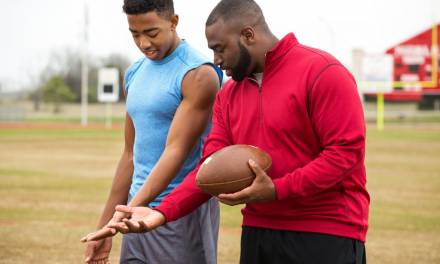A very large percentage of sports are team activities, therefore it is essential that your students can work effectively within a team and build trust with their teammates, and you as their leader.
To work effectively in a team, your students need to be able to confident in their own abilities so they can contribute effectively, not only physically, but mentally as well. They need to be able to tell their defence to ‘get up’ or they might need to motivate their teammates if they are not performing well.
This can only be done if your students are confident enough to talk to their partners on the field about one another’s abilities. A student who isn’t sure whether they are good enough at the sport may find it more difficult to get others to do things. It is your job as sporting leader to ensure everyone is confident to play.
However, communicating is a two-way transaction. Your students must be able to listen as well as talk. They have to be able to listen to what other people are saying, and take on board their opinions. If they don’t agree with what their teammates are saying they must be able to, without shooting them down, explain why they don’t want to do that and give an alternative option.
You must therefore encourage discussions during your training sessions in order to increase your students’ confidence. However, you must also teach listening skills and then encourage discussion surrounding their ideas.
Building trust can take quite a long time, but when being thrust into a competitive situation trust needs to be gained very quickly. There is no time to earn trust; it has to be given unconditionally. It is important then for your students to realise that trust is given and should be respected. If one of your students breaks the trust of their team, they have let them all down.
When putting your students into teams, it is a good time for you to build the trust of your pupils. If you put them into teams that they will be able to communicate with, and even better, if they have already communicated and built trust with, your students will see you in a better light. They will realise that you pay attention to their previous and current relationships.
For example, if you know two students do not get on, then it may be better to keep them apart. This will show that you do care, and your students will trust your decisions in the future. Building trust and working effectively in teams work hand in hand.
You cannot work effectively in a team without having trust, and you gain trust by working effectively in teams. Your students should already trust you, so you have the authority to tell them what teams they work best in.
They may disagree with you, but it is important to reiterate that you are doing your best for them. Help them to communicate well with each other, and they will trust you more as well as their teammates.









